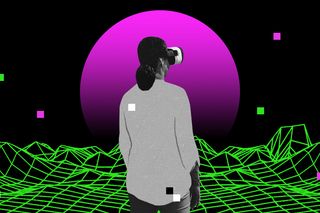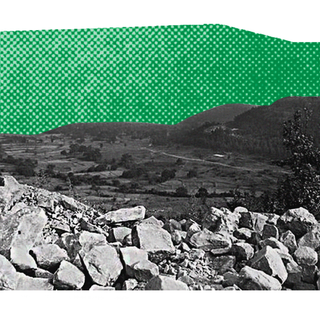
Why the Origin and Impact of the Metaverse Is Worrying
The metaverse is a symbol of big tech’s increasing power and reach. The question is: is it made for people, or only companies?

“One day soon, we’ll be hanging NFTs [non-fungible tokens] on the walls of our digital homes and buying Balenciaga tops for our digital selves.”
This is how writer Nick Bilton describes the metaverse, a centralized virtual world that has piqued humanity’s interest and inspired innovation for a long time.
The concept originated in the 1992 dystopic novel Snow Crash. But its earlier, raw versions existed in the form of online gaming and chatting communities (think AOL, World of Warcraft). Like a tide, the interest in virtual experiences morphed into digital glasses, headsets, contact lenses. The metaverse was a layer to the real world.
But this parallel to the physical world isn’t purely a sci-fi notion. “Whether in virtual reality (VR), augmented reality (AR), or simply on a screen, the promise of the metaverse is to allow a greater overlap of our digital and physical lives in wealth, socialization, productivity, shopping, and entertainment,” TIME noted. “These two worlds are already interwoven, no headset required.”
What explains this fixation with a second life, a digitally constructed one? For one, it’s wildly fascinating and innovative. Like inthe video game Fortnite, people can attend concerts together (Ariana Grande hosted a virtual concert), build structures. It’s easy and efficient. The metaverse is a logical extension of our digital lives: one marked by NFTs, cryptocurrencies, hybrid offices, online social communities, video calls. These social experiences are visceral and real just as physical interactions; most of our time is now spent in digital spaces.
Plus, the metaverse (and all things virtual and augmented reality) tap into a desire for longevity, of finding ways to extend our experiences.
“The metaverse represents a techno-optimist vision for a future in which culture can exist in all forms at once,” writer Kyle Chayka explained in The New Yorker. Some even argue that people are “growing up with the expectation that a large part of their future will exist in the metaverse.” It begs the question: what happens to the present?
Related on The Swaddle:
The Great Social Cost of Facebook Prioritizing Profit Over Minimum Public Good
On an immediate level, the metaverse will change how we interact. The metaverse is building a world where digital life matters more than the physical one — which is telling of how we see ourselves. The day that Facebook shut down felt like a “digital apocalypse,” as people were disconnected immediately from uploaded lives. The metaverse “might change the way we interact in the same way that mobile devices have changed society today.”
In the books (Snow Crash and Ready Player One), the metaverse is “often portrayed as a dystopia, run by one megalomaniac who is hell-bent on ruling over everyone in society, and doing so through the technology he runs,” Vanity Fair noted. The description may bear resemblance to a certain someone.
The metaverse comes from a place of rebranding. Last month, Facebook CEO Mark Zuckerberg said the company is rebranding itself as Meta to underline “its virtual-reality vision for the future.” This is a company in the eye of the storm; recent investigations have found Facebook guilty of neglecting hate speech, mental health issues, democratic chaos. All while it prioritized profit over the public good.
So while the metaverse vision builds onto pre-existing tech, it is modeled under an ethically dubious shadow. A whistleblower also drove the concern home by pointing out Facebook and big tech’s ignorance of non-western countries. A raft of memos, some of which flagged anti-minority sentiments around the 2019 elections and others during the 2019 NRC protests, were hastily ignored. The impact big tech has on hate speech, or how algorithms fuel bias and misinformation in an already polarized society, is just beginning to unravel as people pay attention.
Facebook was aware that hate speech was spreading on its site in India which could exacerbate ethnic violence, but failed to address the problems, according to reports. The language blind spots in big tech also revealed themselves: Facebook fell grievously short of identifying hate speech and violence in regional languages.
This forms the immediate context of the metaverse. “With Facebook’s ambitions to create hardware and other technology…it means more sensors in people’s homes, collecting vast amounts of data,” cybersecurity journalist Kate O’Flaherty noted in Forbes, calling Metaverse a privacy nightmare. “You’re then trusting Facebook to keep data private.”
Related on The Swaddle:
‘High Profile’ Users Often Get a Free Pass to Violate Facebook’s Rules: Report
Experts have raised significant privacy concerns. Facebook whistleblower Frances Haugen noted the virtual reality world could be used to steal people’s personal information. Haugen also worked that people who refuse to participate in this hybrid reality would be at risk of losing jobs. Big tech’s exploitation of individual data — to aid big companies and fascist governments — is well documented. Writer Zak Doffman articulated the tussle at the heart of metaverse: “Am I to believe, Mark, that Meta is going to create a virtual world that you expect me to put my kids in and the simple task of tasking toxic content down off your social platforms you have palpably failed to do. The Metaverse needs to be a safe environment and people don’t think Facebook is safe at the moment and that’s going to be the biggest issue.” Notably, Facebook’s trustworthy score fell drastically after the “Facebook Files.” It fell again when the company announced its rebrand Meta.
The multi-billion-dollar fixation of Silicon Valley and Hollywood ignores the dangers of a seemingly “revolutionary” technology. In a March-dated memo, former Facebook employee and Meta chief technology officer Andrew Bosworth said the metaverse could pose an “existential threat” to the company. One, there is no promise of safety; moderating what people say and do “at any meaningful level” is practically impossible.” Virtual reality could prove to be a particularly toxic environment, especially for women and minorities. Two, Bosworth warned that harmful behavior like bullying could be amplified in an interactive environment.
The Indian cost of fixating over the metaverse deserves scrutiny. For one, Metaverse’s impact on society like India, one already grappling with digital privacy and regulations, could be unprecedented. “Our general disregard for privacy and its value in our everyday (offline) lives has led to a blindness to how this right to privacy is being flouted by powerful actors,” Usha Raman, a professor of media studies and digital culture at the University of Hyderabad, told The Swaddle.
At once, the metaverse is both the “next version of the internet” and the internet’s “next big thing.” As Chayka puts it: “The more immersive it is, the more inescapable it becomes, like an all-encompassing social-media feed, with all the problems thereof.”
The metaverse is indubitably a symbol of big tech’s increasing power and reaches in civil society. The question is: is it made for people or only companies?
Saumya Kalia is an Associate Editor at The Swaddle. Her journalism and writing explore issues of social justice, digital sub-cultures, media ecosystem, literature, and memory as they cut across socio-cultural periods. You can reach her at @Saumya_Kalia.
Related


Earth’s First Land to Rise Above the Ocean is in India
